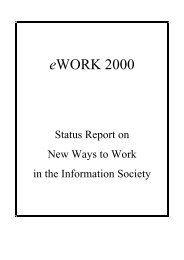Proceedings of 8th European Assembly on telework (Telework2001)
Proceedings of 8th European Assembly on telework (Telework2001)
Proceedings of 8th European Assembly on telework (Telework2001)
Create successful ePaper yourself
Turn your PDF publications into a flip-book with our unique Google optimized e-Paper software.
134FreelancingFreelancing in traditi<strong>on</strong>al creative pr<str<strong>on</strong>g>of</str<strong>on</strong>g>essi<strong>on</strong>s such as translators, journalists, artists, researchers,s<str<strong>on</strong>g>of</str<strong>on</strong>g>tware developers and graphic designers have been in practice for many years. With the spread <str<strong>on</strong>g>of</str<strong>on</strong>g>the Internet the idea <str<strong>on</strong>g>of</str<strong>on</strong>g> freelancing became more popular. The number <str<strong>on</strong>g>of</str<strong>on</strong>g> self-employed <strong>telework</strong>ersin internet-related jobs (web design, web programming, c<strong>on</strong>tent development, <strong>on</strong>line research, etc.)is growing al<strong>on</strong>g with the demand for such services. Hundreds <str<strong>on</strong>g>of</str<strong>on</strong>g> Hungarian individuals and smallcompanies have entered internati<strong>on</strong>al marketplaces such as Elance, SmarterWork, Guru.com, etc.to experiment transborder <strong>telework</strong>ing and to find new clients from all over the world.The first Hungarian freelance marketplace was launched in July 2001 at interwork.hu. This wasfollowed by a vertical marketplace specialized in translati<strong>on</strong>s projects, called the Wired OnlineTranslator. Both services have been developed in Hungary and are aimed at helping to match smalland mid-sized outsourced projects with service providers within the country <strong>on</strong>line.Government Acti<strong>on</strong>sMany business entities expect that the state and the government will play a role in the promoti<strong>on</strong> <str<strong>on</strong>g>of</str<strong>on</strong>g><strong>telework</strong> in Hungary, for example, through public tenders, tax allowances, etc. which would makeemployers interested in employing more <strong>telework</strong>ers.In 1998 a budget <str<strong>on</strong>g>of</str<strong>on</strong>g> 400 milli<strong>on</strong> Forints ($1.5m) was targeted at two groups, the disabled andmothers <str<strong>on</strong>g>of</str<strong>on</strong>g> young children based at home. As a result <str<strong>on</strong>g>of</str<strong>on</strong>g> this project <strong>on</strong>ly a few new jobs werecreated and most <str<strong>on</strong>g>of</str<strong>on</strong>g> them were not sustainable after the grants were over. The relatively smalluptake can be explained by c<strong>on</strong>diti<strong>on</strong>s specified in the project as well as by the fact that generallyentrepreneurs are not seeking to employ people from either target group. In fact, the Governmentoverestimated the role <str<strong>on</strong>g>of</str<strong>on</strong>g> <strong>telework</strong>ing in job creati<strong>on</strong>.Less<strong>on</strong>s from the failed project have been learnt and new initiatives are elaborated with a newapproach. It is now clear that <strong>telework</strong> cannot be an effective weap<strong>on</strong> in combating unemployment.It is thought however that it can play a role in rearranging regi<strong>on</strong>ally unbalanced ec<strong>on</strong>omicdevelopment, for example in helping in the development <str<strong>on</strong>g>of</str<strong>on</strong>g> the east <str<strong>on</strong>g>of</str<strong>on</strong>g> Hungary. In Hungary, wherethe territorial mobility <str<strong>on</strong>g>of</str<strong>on</strong>g> people is <str<strong>on</strong>g>of</str<strong>on</strong>g> a very low intensity; it is thought that <strong>telework</strong> may help tochannel labor into the performance <str<strong>on</strong>g>of</str<strong>on</strong>g> work that they would be unable to reach in the traditi<strong>on</strong>alway because <str<strong>on</strong>g>of</str<strong>on</strong>g> the distances. In order to reach such goals, the Government subsidizes the spread<str<strong>on</strong>g>of</str<strong>on</strong>g> telecottages. Over 200 telecottages are operating in Hungarian villages and new <strong>on</strong>es are to openso<strong>on</strong>.The Commissi<strong>on</strong>ers’s Office for ICT in Hungary that has recently been founded with the aim <str<strong>on</strong>g>of</str<strong>on</strong>g>accelerating the process to develop the informati<strong>on</strong> and communicati<strong>on</strong> technologies in Hungaryprepared the “Nati<strong>on</strong>al Strategy for the Informati<strong>on</strong> Society” in 2001. As part <str<strong>on</strong>g>of</str<strong>on</strong>g> this projectHungarian businesses were invited to tender <strong>on</strong> projects related to the development <str<strong>on</strong>g>of</str<strong>on</strong>g> informati<strong>on</strong>society. There was a huge resp<strong>on</strong>se to the invitati<strong>on</strong> to tender. Selecti<strong>on</strong> <str<strong>on</strong>g>of</str<strong>on</strong>g> the winners is nowin process, and the implementati<strong>on</strong> <str<strong>on</strong>g>of</str<strong>on</strong>g> winning projects including many related to e-work ande-learning will start in September this year.








